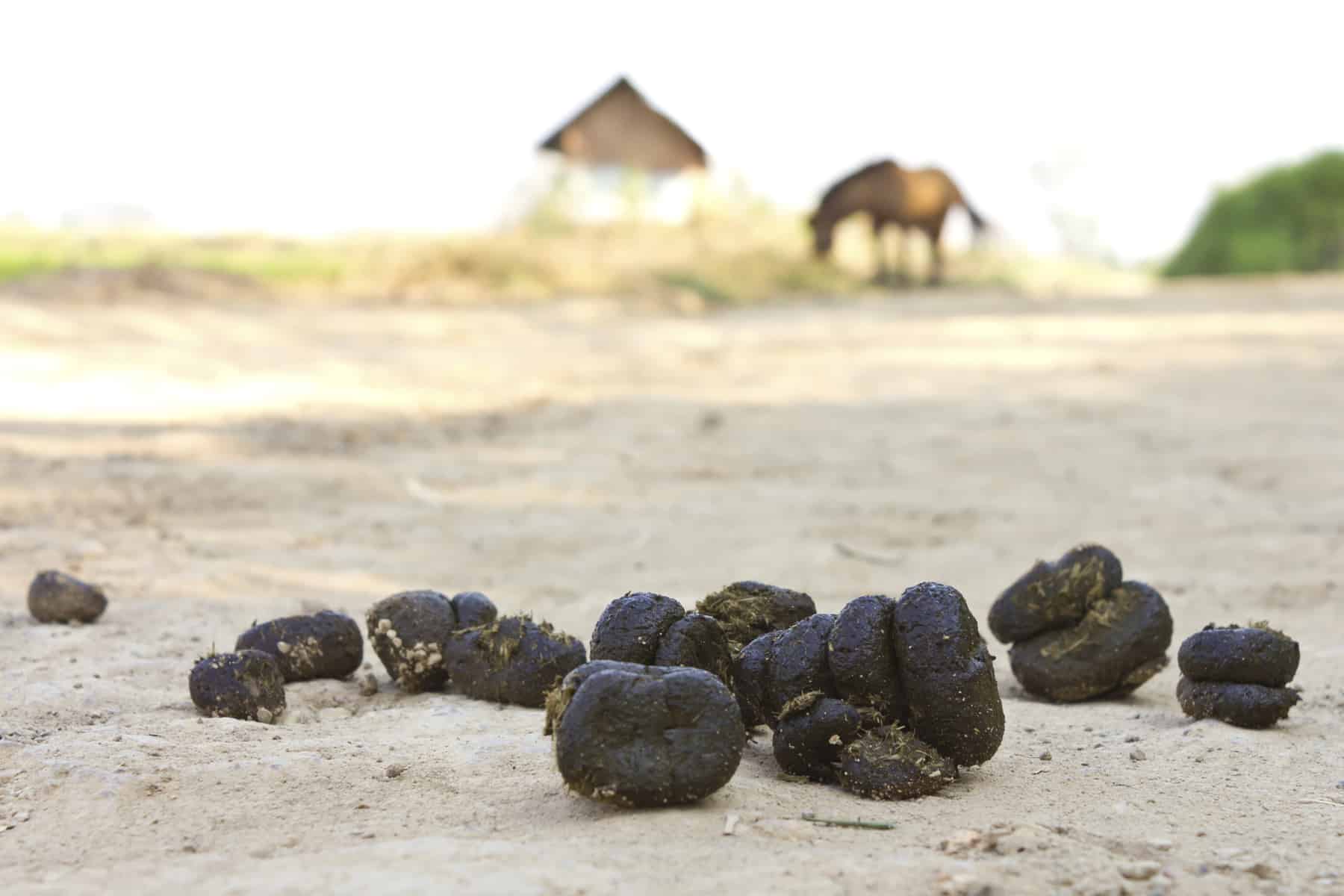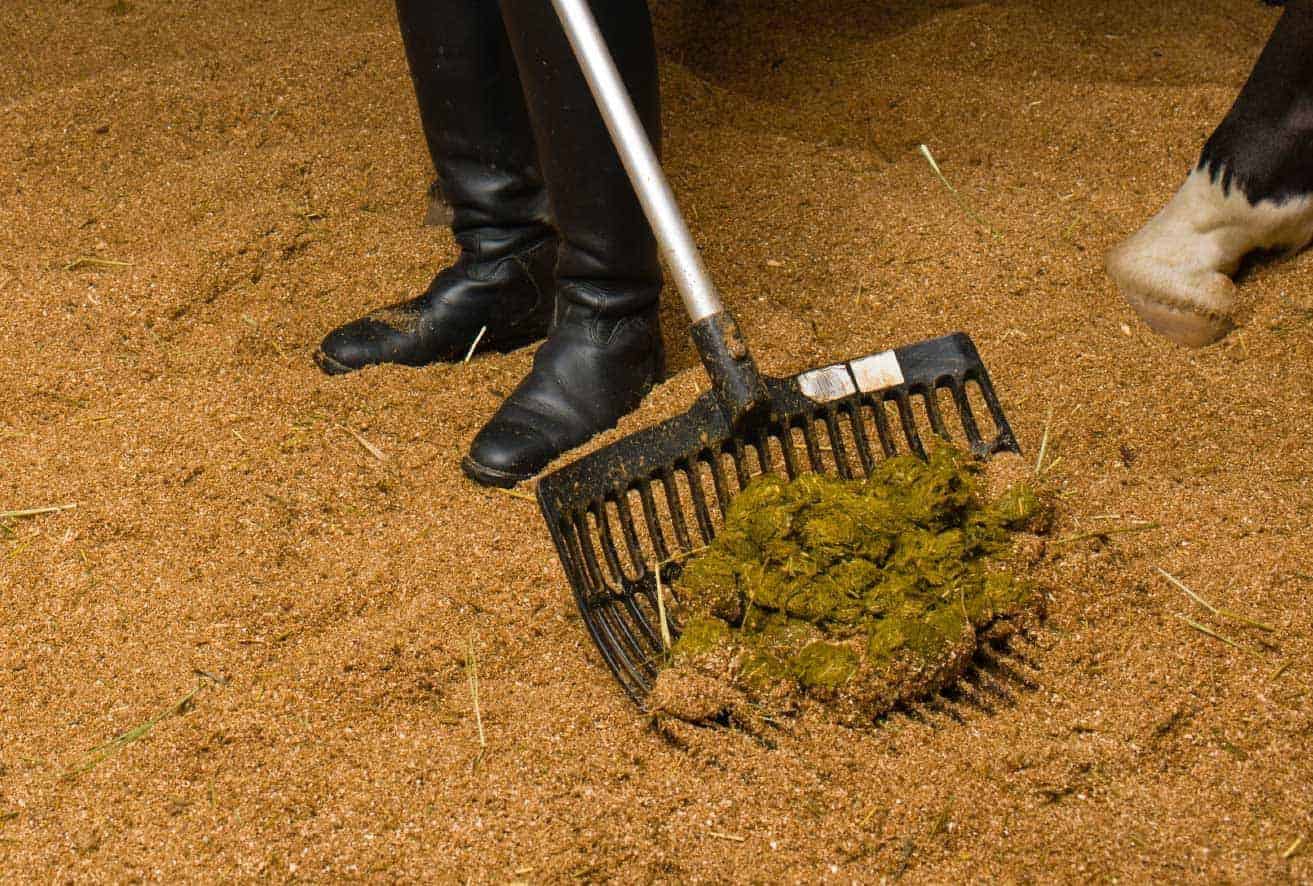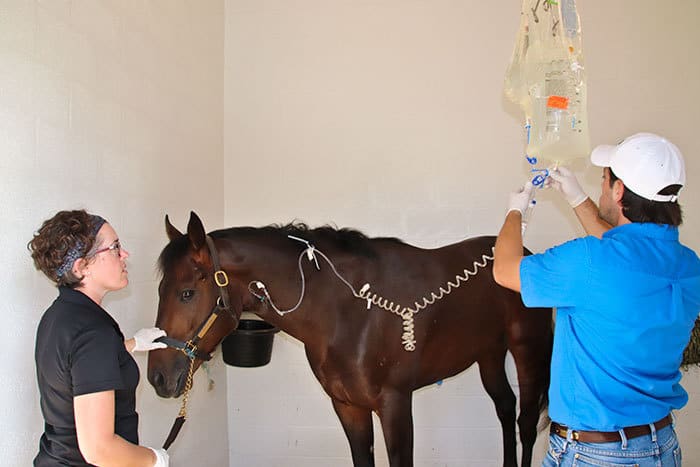The Rules of ‘Poopspection’: Analyzing Your Horses’ Manure

Know your horse’s poop habits—they can provide a wealth of information about his well-being
Get your pitchfork out, put your gloves on: It’s time to get an up-close look at that pile. Sure, it can get a little gross, but knowing your horse’s normal poop, how much he produces, and any related changes is part of good husbandry. Often considered a nuisance, horse manure is rich in not only energy and soil-building nutrients but also information about your horse’s health and well-being.
To help you better “read” your horse’s poop, we’ve consulted the experts to compile some poop-inspection—poopspection, if you will—guidelines. May these tips shed light on your horse’s gastrointestinal (GI) health as you sift through many piles of equine poop to come.
1. Know Thy Horse’s Poop
Horses are “creatures of habit,” says Michael Fugaro, VMD, Dipl. ACVS, owner of Mountain Pointe Equine Veterinary Services, in Long Valley, New Jersey. This includes their GI habits—how often they poop, what it looks like, and even where they poop. Observing your horses’ defecating behaviors and manure quality regularly can help you get a feel for what’s normal—an essential step in knowing what’s abnormal, he says.
“The biggest things to consider are consistency and timing,” says Fugaro. “So, for example, you can expect a certain number of well-formed piles for your particular horse every day.”
Expect minor horse-to-horse differences, such as slightly smaller but more frequent piles or smallersized balls—especially with ponies or youngsters.
Checking individual poop habits might be harder to do with horses at pasture, but you can still be observant, says Lucas Pantaleon, DVM, Dipl. ACVIM, an equine internal medicine specialist in Versailles, Kentucky. While it might be challenging to know whose poop belongs to whom, you can check generally for quantity, pile size, and consistency.
“Get to know your herd’s normal habits,” he says. “If the horses are getting the same pasture turnout, water source, and grain, and they’re not on medications that could impact their feces, output should be fairly consistent across horses.”
Some medications, such as antibiotics, affect the normal bacteria in the horse’s intestines, whereas others can influence the movement of feed material through the digestive tract—both of which have a laxative effect.
Slight variations aren’t necessarily concerning, Fugaro says. Like humans, horses can have mild, inconsequential stool changes. “It’s just something to follow,” he says.
2. Consider Poop in Thy Daily Wellness Checks
Once you have a grasp on what’s normal, keep poopspection part of your regular daily routine, our sources say. This doesn’t mean in-depth analyses but, rather, just a glance around to see if anything stands out as abnormal.
“It’s definitely something I encourage clients to do to contribute to their general arsenal of visual diagnostics,” Fugaro says.
When you’re in the field or stall checking poop, you’re also just getting to know your horse better and, well, more intimately, says Pantaleon.
“I don’t think any kind of observation is excessive,” he says. “And getting to know your horses so well that you understand their trends means you’ll pick up any changes a little faster, keeping your vet informed and being more aware of other signs (like fever or lethargy). It’s a useful exercise.”

3. Alert Thyself to Small, Hard Poop Balls
What you want to see are piles of moist, spongy balls a little bigger than golf balls, our sources say. While the precise qualities might vary slightly between horses, you don’t want to see balls that are smaller and harder than what they usually are for that horse.
“When the balls change to smaller and rock-hard, that’s not normal, and it’s a classic sign of dehydration,” says Fugaro.
Small, hard balls are typical of feces removed from the rectum in colicking horses that are experiencing shock, he adds. This happens because the colon (the portion after the cecum, or fermentation vat, of the GI tract) squeezes the water out of the feces, allowing for reabsorption of water into the bloodstream to rehydrate the horse.
Dry stool is often associated with impaction colic, and it’s frequently the result of reduced water intake, says Pantaleon. It could also be caused by a sudden diet change (such as switching from pasture grass to dry hay).
At the first sign of smaller, harder stools, encourage your horse to drink more, says Fugaro. Ambient-temperature water and additives such as diluted Gatorade or dissolved molasses could tempt him to drink, though these sugary substances are not recommended for horses with metabolic issues. Constant access to a salt block or electrolytes added into feed might also make the horse more thirsty and consume more water, he says.
4. Alert Thyself to Liquidy Poop
A little loose stool might not be much to worry about, says Fugaro. A soupy pile of formed balls could be a short-term reaction to a dietary change, a slight digestive upset, or even an emotional stress, he says. In this scenario, keep an eye on the manure to see how it evolves—stool should ideally be back to normal within 72 hours, he explains.

Full-blown liquid diarrhea, however, merits immediate attention. “The worst-case scenario is when it turns to nothing but water, and they’re painting the walls with it,” Fugaro says. This kind of diarrhea can be caused by colitis induced by infections and/or antibiotics in rare cases. “This is life-threatening, so owners need to catch it before it gets to this point.”
Between the ball-soup and wall-paint consistencies is the cow-patty, says Fugaro. If horses are pooping like cattle, they need veterinary attention. Diarrhea can progress to the wall-paint stage in as few as two hours to up to two days.
Runny poop combined with other issues, such as fever, lethargy, or refusing to eat, could mean the horse is fighting a bacterial or viral infection, says Pantaleon.
“These signs suggest a high likelihood for infectious disease—Salmonella, Clostridium difficile, coronavirus, or Potomac horse fever, to name a few,” he says. “In foals it could also mean rotavirus or Lawsonia intracellularis (responsible for equine proliferative enteropathy, which thickens the small intestine’s lining).”
Intestinal parasites might also be a cause of diarrhea, he says. Or, runny poop could be related to chronic inflammatory diseases within the gastrointestinal tract or even certain cancers. In these cases the horse would have loose stools over a long period (several weeks) and would lose body condition because of a reduced ability to absorb nutrients.
5. Introduce Biosecurity Measures if Thou Art Suspicious
As mentioned, loose stools associated with fever or depression warrant concern for disease spread. Even if the cause doesn’t turn out to be infectious, it’s better to be safe than sorry.
“If you suspect a horse has an infectious disease, isolate him and implement biosecurity protocols right away (before the vet arrives) to minimize and potentially prevent disease spread,” says Pantaleon.
Use a pre-established isolation stall, or choose a stall at the end of the row, and keep the stall beside it empty. Make sure people coming in and out of the stall use protective equipment such as disposable gloves, washable rubber boots, and even coveralls, and have them change clothes and take a shower before handling other horses. (Ideally, they should manage the affected horse at the end of their rounds.)
Handlers should avoid sharing equipment, including halters, grooming tools, muck tubs, and thermometers, he says.
6. Consider Thine Horse’s Fecal Fiber Length
Each little spongy ball of poop is packed full of fiber strands. Pick one up (with a gloved hand, of course) and see for yourself! These strands are what’s left of forage after it’s been digested for 48 hours in the 100-foot equine digestive tract and finally pooped out onto your stall floor. And they’re little upper-GI messengers.
“We can delineate a lot of information about how horses are grinding their food by looking at fiber length in feces,” Fugaro says. For example, if fibers are gradually getting longer over time, the horse might be having dental issues that prevent him from chewing his food properly.
If the fibers seem to be mixed with a lot of grainy material, the horse might be ingesting sand—especially if he lives in a sandy area, says Fugaro. Fortunately, there’s an easy home test to check that.
“You can float fecal balls in water inside a plastic bag,” he says. “If sand collects at the bottom of the bag (after about 15 minutes), your horse could be consuming too much sand.”
Ingesting sand can irritate, weigh down, and obstruct the gut, leading to sand colic. Talk to your veterinarian about treatment options such as psyllium to help clear it up.
7. Note What Thine Nose and Eyes Behold
Horse poop isn’t all that stinky, and we’re not just saying that because we’re horse crazy. Herbivore feces in general create less unpleasant odor than carnivore feces, and horses have comparably less foul intestinal production than many other domestic animals. It still stinks a little, though. And that’s okay.
What’s not okay is when the odor evolves from its normal smell and becomes something unusual or extremely foul. If you walk into the barn and think, “Wow, that’s a weird, strong smell,” it could be a sign of trouble, our sources say.
“In cases of severe colitis, the lining of the intestines actually becomes diseased and even necrotic, creating a classic putrid smell,” says Fugaro.
Rotavirus in foals also has a telltale stink, says Pantaleon. “The foal isn’t able to digest milk, so the milk gets fermented in the hindgut (the cecum, large intestine/colon, and beyond), creating a characteristic odor,” he says.
Consider color, as well. Manure should be greenish brown; red or black indicates blood in the stool. While horses rarely have blood in their poop, it can happen. “Sometimes it’s fresh red blood, and it’s just due to broken blood vessels due to straining, similar to a human hemorrhoid,” says Fugaro.
Dark/black poop suggests bleeding higher in the GI tract, as the blood gets digested in the colon, our sources say. However, this is extremely uncommon.
“You might see a black coffee-ground texture kind of feces as a result of bleeding ulcers from a section of the intestine (such as the stomach or colon) or from some other upper GI abnormality, but that’s rare,” says Fugaro. Unlike in humans, gastric (stomach) ulcers in horses usually don’t lead to black stools.
8. Rely Not on Poop Habits Alone
Poopspection is a useful horse management skill, but always consider your findings in the context of other physical and behavioral signs.
“You really need to be looking at the whole picture,” says Pantaleon.
For Fugaro, it’s important to remember that home poop analysis isn’t the “end-all of decisions, but one component of many” in considering a horse’s condition.
“Owners shouldn’t be fixating incessantly on changes in manure habits,” he says. “On the flip side, subtle changes, are worth discussing with your veterinarian or at least keeping an eye on.”
9. Do Not Call Thy Veterinarian in a Panic
Notice some poop changes this morning? Don’t trip over your manure piles running to the phone. Except in cases of severe watery diarrhea, most poop changes alone aren’t suggestive of an emergency.
“If you come into the stall and see one bout of diarrhea, but the horse is happy and eats all the grain, and you take his temperature and find there’s no fever, then I’d say call the veterinarian but don’t consider it urgent,” says Pantaleon. “Just monitor him and see what his subsequent stools do.”
Fugaro agrees. “Keep one eye open, but that doesn’t mean push the panic button,” he says.
A sudden onset of significant bowel changes in addition to other signs (fever, depression, pain) constitutes “more of an emergency,” says Pantaleon.
Stool changes that aren’t accompanied by other signs but continue for 48 to 72 hours might warrant a veterinary visit just to see if there’s something going on worth investigating, adds Fugaro. “When it’s just a change in consistency and nothing else, we can’t really aggressively go and do something then and there,” he says. “Better to wait and see how it progresses or if other signs appear.”
Take-Home Message
Observant and attentive owners monitor their horses closely, recognizing both what they consume and their output. Less smelly and sticky than most other mammals’ feces, horse poop is easy to inspect and contributes to your arsenal of wellness information about your animal. By following these rules—and keeping in mind that poop is just one of many factors to consider during an evaluation—you can ensure you’re doing your best to get a global look at how your horse is faring.

Written by:
Christa Lesté-Lasserre, MA
Related Articles
Stay on top of the most recent Horse Health news with















